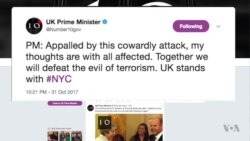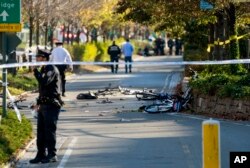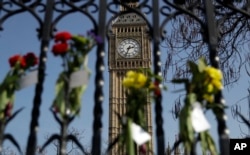European leaders have been offering their condolences and support in the wake of the terror attack in New York, which killed eight people. The suspect, shot and wounded by police, has been named as Sayfullo Saipov, who had lived in the U.S. since arriving from Uzbekistan in 2010.
The attacker used a rented truck to ram cyclists on a bicycle path in Manhattan. Such scenes of carnage are sadly familiar in many European cities.
Britain’s Prime Minister, Theresa May, wrote on Twitter she was “Appalled by this cowardly attack, my thoughts are with all affected. Together we will defeat the evil of terrorism.”
But how?
New York’s governor called it a ‘lone wolf’ attack with no evidence of a wider plot. It underlines the changing global terror threat, said security analyst Afzal Ashraf of Britain’s University of Nottingham.
“A change that has occurred progressively since the 9/11 attacks, where larger plots are now being replaced by these so-called lone wolf attacks using readily available equipment such as vehicles.”
The New York attack echoes recent error incidents across Europe. In June three attackers used a van to hit pedestrians on London Bridge, then used knives to attack passers-by.
Less than three months earlier a lone attacker drove into pedestrians in Westminster before fatally stabbing a police officer.
London authorities have since installed barriers on several key roads. But it is impossible to fully protect against such attacks.
“We’re talking about an enormous number of areas we’re talking about billions of dollars’ worth possibly of protective barriers. And all of these barriers will of course be successful, but the terror threat will move on,” said Ashraf.
French Prime Minister Edouard Philippe said Wednesday the New York attack was a stark reminder of the global threat.
“The threat level is high around the world and our objective is to provide credible answers, firm answers, and to guarantee a high level of security for French people,” Philippe said.
France has suffered more than most, with hundreds killed in recent attacks in Paris and Nice. French President Emmanuel Macron Tuesday signed a new anti-terror law bringing in sweeping powers.
“It will also allow for very specific measures to fight against terrorism, by allowing particular raids or by having measures on a case by case basis against identified individuals,” President Macron told reporters.
His U.S. counterpart, President Donald Trump, wrote on Twitter that he has ordered more robust 'extreme vetting' of travelers.
Europe is unlikely to follow that path, said Ashraf. “It’s not at all clear to me that there is a form of vetting which will increase the already present safeguards sufficiently to detect potential terrorists,” he said.
Security analysts stress it is almost impossible to fully protect against so-called lone wolf terrorists intent on causing harm.









